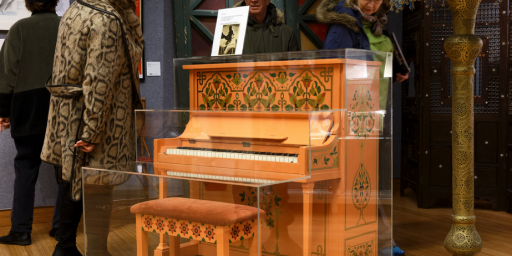Man Sells Elvis Collection to Win Girl
Jim Curtin has sold off his Elvis collection to win back his girlfriend.
Hundreds of pieces of Elvis Presley memorabilia were auctioned off over the weekend by a longtime collector trying to win back his girlfriend after she warned: “You leave the Elvis clothes or I’ll leave you.”
The items auctioned included three Elvis concert suits, two of which sold for $125,000 and $50,000, said Alan Lipkin, senior vice president of Regency-Superior, which organized the online auction. The third was still on the auction block. Also sold were necklaces Elvis gave to girlfriends and friends, cufflinks he received from President Nixon and belt buckles he wore, Lipkin said.
The seller, Jim Curtin, collected 600 cartons of Elvis memorabilia for more than 30 years and met the star several times. His unrelenting adoration eventually got the attention of Elvis, who personally presented Curtin with a white jumpsuit he wore in a Houston concert in 1974, according to the Regency Web site.
So why give up the lifetime collection? “He’s doing this to try to win back his girlfriend,” said Lipkin.
My guess is that he’ll regret this decision even if he gets the girl. Indeed, especially if he gets the girl.
I’ve never met Curtin but it’s quite possible that his Elvis fixation was obsessive. On the other hand, he’s apparently derived decades of pleasure from it. It is, for good and ill, a major part of who his is. Any woman who would demand he give it up is by definition incompatible with him.






Would’ve been easier to find a girl that liked Elvis, especially considering the memorabilia.
The girl is a fool. She should either accept him as he is or move on.
He will probably grow to resent her ultimatum.
She has “fouled her own nest”.
Love springs eternal. Yeah, possible he was a lil OCD about the collection/collecting. And just woke up a little bit, and maybe even with a little push from his heart’s affection. Suggesting to him a little life unbalanced?
It’s only ‘stuff’ after all (as much as I get a buzz off of vintage toy trains). I say good on ’em. Whether he gets the girl or not. He’s trying. He sees light, he feels warmth.
Less really can be more.
Elmo, President/Socialist Bloggers Collective [and no, you can’t have my phonograph LP collection :-)]
Poor guy.
What an idiot – and on the King’s birthday no less.
Just watched “Fever Pitch” yesterday, a film about a Red Sox fan who was willing to give up season tickets along the third base line for love.
In the end, the girl let him keep them…
TCB! Uu-Uuhhh-huh!
What the article does not say is that the girlfriend’s new boyfriend is an avid collector of Sinatra memorabilia. She just prefers Old Blue Eyes to Blue Suade Shoes I guess…
Guy: Spinless nerd.
Girl: Goldigging (female dog)
What a great match, they’ll live unhappily ever after.
Not only did he have to sell off his beloved collection of all-things Elvis, his girlfriend/wife-to-be will get 50% of the massive scratch it sold for after their impending divorce.
Actually, California is a “equitable property” state so he’d get to keep assets he brought into the marriage.